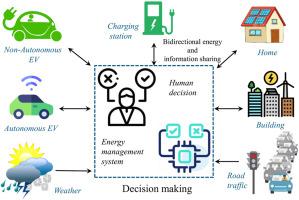State-of-the-art review of smart energy management systems for supporting zero-emission electric vehicles with X2V and V2X interactions
IF 16.3
1区 工程技术
Q1 ENERGY & FUELS
引用次数: 0
Abstract
The accelerated penetration of electric vehicles (EVs) into the transportation market has resulted in increased stresses on the existing electric infrastructure and required charging facilities, boosting intensive research efforts in recent years for addressing energy management challenges. However, a systematic review is missing for summarising the following three academic progresses: (1) The sorting of energy management systems for supporting the zero-emission charging of EVs; (2) The classification of solutions to address the challenges of EV charging with increased automation levels, which are increasingly interacted with diversified information, typically represented by the “X2V” and “V2X” technologies; (3) The summary of diversified methodologies for seeking the multi-objective optimal decisions of charging processes and patterns, while coordinating the energy resources and impact between the generation, demand, and grid sides. Accordingly, this paper has conducted a state-of-the-art review of energy management systems for low-emission and zero-emission EVs to cover the above three unsorted review areas. Both the non-autonomous and autonomous EVs are covered in this review, with an aim to identify and classify the different features of energy supporting solutions, the role of X2V and V2X functions, and the required business models. Via this review, recent research trends have been noticed for the smart inclusion of EVs as part of future energy infrastructures, typically in the form of controllable demand and power reserves, mobile energy storage, and backup energy flexibility resources. Nevertheless, practical business models for better incentivising the smart charging of autonomous zero-emission EVs are still largely missing and limited.

支持 X2V 和 V2X 交互的零排放电动汽车的智能能源管理系统最新进展综述
随着电动汽车(EV)加速进入交通市场,对现有电力基础设施和所需充电设施的压力也随之增大,从而推动了近年来应对能源管理挑战的密集研究。然而,目前尚缺乏系统性综述来总结以下三方面的学术进展:(1)支持电动汽车零排放充电的能源管理系统分类;(2)应对电动汽车充电挑战的解决方案分类,随着自动化水平的提高,电动汽车充电越来越多地与以 "X2V "和 "V2X "技术为典型代表的多元化信息互动;(3)寻求充电过程和模式的多目标最优决策的多元化方法总结,同时协调发电、需求和电网三方的能源资源和影响。因此,本文对低排放和零排放电动汽车的能源管理系统进行了最新综述,以涵盖上述三个未分类的综述领域。本综述涵盖了非自主和自主电动汽车,旨在对能源支持解决方案的不同特点、X2V 和 V2X 功能的作用以及所需的商业模式进行识别和分类。通过本综述,我们注意到最近的研究趋势是将电动汽车作为未来能源基础设施的一部分,通常以可控需求和电力储备、移动储能和备用能源灵活性资源的形式进行智能化。然而,更好地激励自主零排放电动汽车智能充电的实用商业模式在很大程度上仍然缺失且有限。
本文章由计算机程序翻译,如有差异,请以英文原文为准。
求助全文
约1分钟内获得全文
求助全文
来源期刊

Renewable and Sustainable Energy Reviews
工程技术-能源与燃料
CiteScore
31.20
自引率
5.70%
发文量
1055
审稿时长
62 days
期刊介绍:
The mission of Renewable and Sustainable Energy Reviews is to disseminate the most compelling and pertinent critical insights in renewable and sustainable energy, fostering collaboration among the research community, private sector, and policy and decision makers. The journal aims to exchange challenges, solutions, innovative concepts, and technologies, contributing to sustainable development, the transition to a low-carbon future, and the attainment of emissions targets outlined by the United Nations Framework Convention on Climate Change.
Renewable and Sustainable Energy Reviews publishes a diverse range of content, including review papers, original research, case studies, and analyses of new technologies, all featuring a substantial review component such as critique, comparison, or analysis. Introducing a distinctive paper type, Expert Insights, the journal presents commissioned mini-reviews authored by field leaders, addressing topics of significant interest. Case studies undergo consideration only if they showcase the work's applicability to other regions or contribute valuable insights to the broader field of renewable and sustainable energy. Notably, a bibliographic or literature review lacking critical analysis is deemed unsuitable for publication.
 求助内容:
求助内容: 应助结果提醒方式:
应助结果提醒方式:


